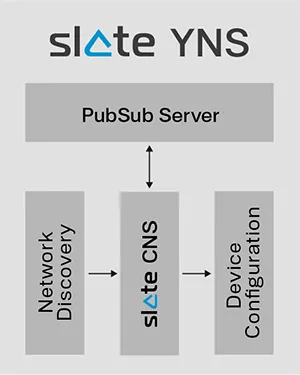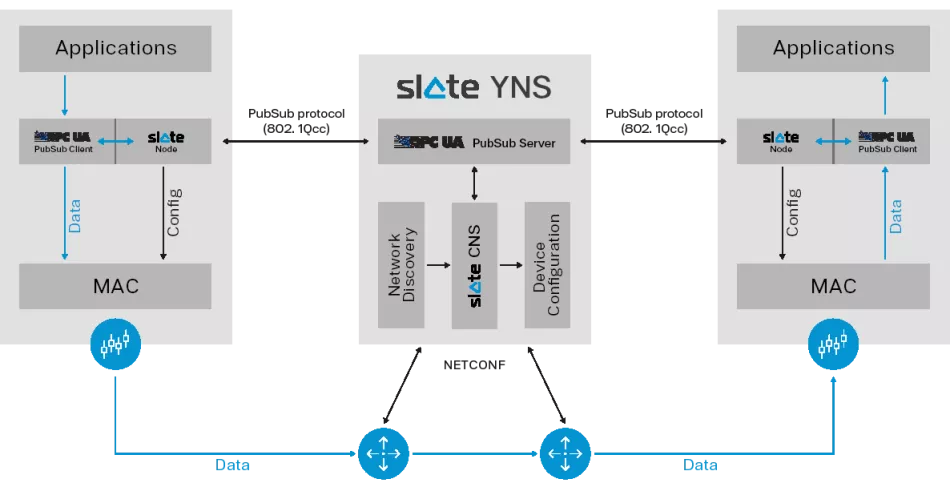Download
Introducing Slate YNS
Slate YNS is an embedded software that interfaces with OPC UA applications to provide automated planning and configuration of TSN networks and devices. Slate YNS does not require any user interface, it simply runs in a network device and facilitates the planning of data streams according to the requirements of OPC UA publishers and subscribers. Configuration of network components is achieved using standard YANG models and NETCONF.

Slate YNS Architecture
Slate YNS plans TSN networks using the Slate CNS planning engine from TTTech Industrial. It establishes system requirements through network discovery and by automatically gathering stream requests from OPC UA publishers and subscribers. Devices are automatically configured, and new publishers and subscribers can be added to the network without requiring any reconfiguration of existing network elements.
Slate YNS Operational Model
Slate YNS includes an OPC UA PubSub server that interfaces with publishers and subscribers. The Slate Node software connects the application on an TSN endpoint to the central Slate YNS software. The library requests the planning of TSN streams according to the application's demands. It configures the local network device and informs the application about required timing properties. Slate YNS interfaces with TSN switches and switched endpoints via NETCONF to distribute the relevant configuration files throughout the network.

Supported TSN Standards
IEEE 802.1Qcp
YANG Model for Bridging
Enables communication of basic bridging configuration data (FDB, VLAN, TE-MSTI) between bridges in combination with NETCONF
IEEE 802.1Qcw
YANG Model for Qbv, Qbu, Qci
Extends capabilities of 802.1Qcp to communication of scheduling, preemption and policing configuration data (ST GCL, ST SDU) between bridges in combination with NETCONF
IEEE 802.1CBcv
YANG Model for CB (2022)
Extends capabilities of 802.1Qcp to communication of redundancy configuration data (SID, FRER, PSFP) between bridges in combination with NETCONF
Product Features
Operating Systems |
Linux |
|---|---|
Requirements |
libxml2, libssh |
CUC |
PTCC server |
CNC |
Network discovery based on LLDP and YANG, or topology file input, Dynamic and incremental client-based stream planning, Netconf/YANG model-based deployment, IEEE 802.1Qcc UNI compliant stream requests |
Topologies |
Line, star, ring, tree, ladder, line of rings, ladder of rings |
Device Types |
Switches, endpoints or switched endpoints that support the following derived YANG models |
YANG Models |
IEEE 802.1Qcw Scheduled Traffic (Qbv) and Per-Stream Filtering and Policing (Qci - available 2021) IEEE 802.1Qcp Bridges and Bridged Networks (VLAN support) IEEE 802.1cbcv Frame Replication and Elimination IEEE 802.1cbcv Frame Replication and Elimination for Redundancy (CB) - available 2021 |
Netconf |
NETCONF 1.0/1.1 client |
CNC/CUC Planning Features |
Support for different user defined constraints – End-to-end latency – Transmit window constraint (for time aware streams) – Incremental planning mode enables adding of new data streams and new devices without affecting existing scheduled data streams – Incremental planning mode enables adding of new receivers for existing scheduled data streams e.g. for OPC UA PubSub or other industrial application protocols |
Delivery Package |
Installation guide User manual Embedded Software Core |


